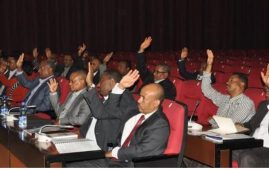(Daniel Berhane)
The swearing in of the new Prime Minister, Hailemariam Desalegn, in the Parliament last Friday, is probably one of the most watched political broadcasts in this nation. That was not merely due to the recent surge in the number of citizens with access to electronic media but due to its significance.
The gravity of the moment was not lost to Hailemariam. In fact, sitting in the media section of the parliament hall, I couldn’t help but notice that his hands were clinched to the table as the ruling party, EPRDF, presents him as a nominee. His nervousness was further demonstrated by his preference to deliver the inaugural speech from his chair.
Indeed, his inauguration was an exciting moment for millions of Ethiopians, albeit for varied reasons.
For the majority, it was mainly an affirmation of stability and continuity. It was reassuring to see Hailemariam, the man hinted as a successor immediately after the passing of Meles Zenawi, take oath, despite weeks of rumors that the EPRDF is divided on the matter. The fact that he was a deputy PM attaches legitimacy to his inauguration given the weight Ethiopians attach to hierarchy and formality.
The Ethiopian psyche, wary of internal instability and foreign enemies during power transitions, saw a relief by the mere fact the transition was smooth. At some level, it was also taken as an affirmation their long-held belief that God looks after their country. Indeed, the calm and unity displayed during the national mourning for the late PM Meles Zenawi seemed to have negated the common apprehension that the nation is dangerously divided.
It is tricky to declare an event as unprecedented in this nation with thousands years of political history. Often than not, one can find anything if only she digs deep enough into the history books.
Yet, Hailemaram’s inauguration stands out unique in a number of ways.
Though he is now a commander-in-chief; Hailemaram never led an army unit, nor had he had to prove his ‘manhood’ in one or another form of deadly contest.
Though the time Hailemaram spent with the late PM Meles Zenawi was one of his qualifications for the Premiership, as indicated during his nomination, he has no kinship whatsoever with his predecessor, except ideologically.
Hailemaram is the first person from the southern (non-Semitic) part of Ethiopia to become head of government without having to subjugate the northern aspirants to the Premiership and without having to denounce/downplay his ethnic identity.
All these, and related factors, should have conspired to create an elated mood among Ethiopians during the inauguration of Hailemariam Desalegne. Presumably, one or more of the aforementioned points impacted even those bitterly opposed to the EPRDF. Needles to say, EPRDF supporters have more reasons to be happier and more optimistic.
What is a bit curious, however, is the scale of optimist observed among several hard-liner opposition activists. Though, all Hailemariam did so far was to assuring everyone that he will follow the path of Meles Zenawi.
Unusually, many in the opposition took time to watch, on YouTube, Hailemariam read seven page long inaugural speech and claimed to have loved it. The speech, however, could as well been written and delivered by the late Meles Zenawi, except the part that says “my main responsibility today is to see through the development plans set in motion by our Great Leader”.
A careful look into the matter is revealing.
For the more informed activists, this is a shrewd move to rehabilitate their image. The ecstasy they displayed during the national mourning for the late Meles Zenawi didn’t only portray them as a bit extreme but also out of touch with the average Ethiopian, especially back home. Indeed, bashing the new PM immediately after his ascension to power would have made them an easy prey to the EPRDF who accuses them of taking irrational political stand.
A hate-campaign against a PM from one of the most marginalized ethnic groups of the country creates uneasiness. Those in the right-wing are already accused of being indifferent to this aspect of history and resisting the political remedies prescribed for it. Those on the left, on the other hand, have long been calling for this day, given its symbolic value to enhance the self-perception and social status of marginalized groups.
Thus, several prominent opposition activists chose to hold fire for a while, though they are aware that there is no change on issues they uphold dear.
The optimism is also partly fueled by their speculation that the new PM is unfriendly to TPLF(one of the core parties of EPRDF) and is recommended by US America. Some even went as far as advising him to purge TPLF officials from the rank and file of the new government, though one would be hard pressed to understand why Hailemariam would alienate one of his strongest political bases.
The opposition media, then, has been kind to the new PM so far. Due to the aforementioned factors and for lack of background info to use against Hailemariam.
It is also natural for people to feel tired of the apparently end-less political polarization and take refuge in the imagined change and hope.
The cumulative result was that ordinary opposition supporters, even the hardliners, were led to fancy a kind of change and hope that probably never crossed Hailemariam’s mind.
There are realistic grounds for optimism, however.
Compared to the time when Meles Zenawi assumed the Premiership, Hailemariam received a stable political system and a growing economy. Indeed, unlike most of the recent Ethiopian leaders, Hailemariam’s inauguration is not overshadowed by an imminent military threat coming from neighboring countries.
The fact that Hailemariam is perceived as a ‘novice’ and a ‘new comer’ might work to his advantage. His initiatives would be less likely to be as part of some sort of grand conspiracy.
He can remove incompetent and corrupt officials, subject to agreement of the ruling party heavy weights, without fearing of being accused of betraying his old friends. Not to forget that the current chairmen of the four EPRDF member parties, including Hailemariam, are not perceived by the public as corrupt. That gives him the political capital and the moral authority to act strongly. Perhaps, that’s why he used the harsh phrase – “officials infected by corruption” – his inaugural speech.
As a new face, he enjoys the liberty to consider modest changes in some diplomatic matters. He can politely ask foreign investors to put on paper previously made “gentlemen’s agreements” regarding their investments.
There would be less resistance if he writes a letter instructing the Human Rights Commission and the Ombudsman to make their recommendations public whenever a government agency fails to listen to them. He can sign a circular that instructs regions to make Kebele social courts structurally and financially independent from the Kebele officials, while empowering them to review the decisions of the latter. And so on.
The fear that his Premiership will be dwarfed by more senior EPRDF political heavy-weights is perhaps dispelled by the announcement that the party’s leadership replacement plan will be fully completed this year, thereby leaving Hailemariam with leaders of his generation.
**************
Check the dropdown menu at the top for related posts.






Dani Qesu ! I think you are pretty naeve or ignorant supporter of the regime. Let us take a look at your points afresh. No wander Hailemariams inaguration was widely seen in Ethiopia, because it was live in ETV which is legally the only TV in the country whose majority of the youth population is unemployed and watches the only available TV.
Yes the oposition media, and the opposition at large has been king to Hailemariam so far but you should as well know that it will continue to be. Because they know that this man will not have the slightest power over the military and the security apparatus which in tern have influences on the judicial system and the media. Technically speaking, the man will be left “an insider opposition’. I have seen your weak anticipations on cuople of blogs including on meleses death news by ESAT. If you wana wait and see, please anticipate another Negaso from southern nations in the Minilik place within the comming few months
Thank you for shedding light on something that in the past i found completely obscure. Breath of fresh air!